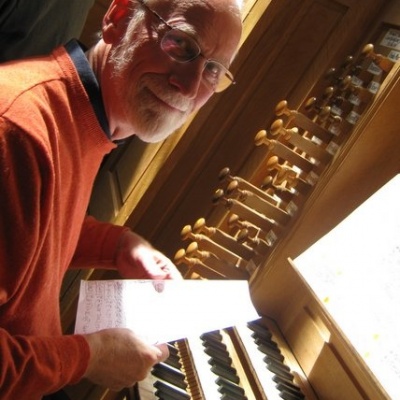
Christopher Herrick
Christopher Herrick is an English organist. Early life Born in Bletchley, Buckinghamshire, Herrick was a boy chorister at St Paul's Cathedral and attended its choir school; he sang at the coronation of Queen Elizabeth II in 1953 and later that year went with the choir on a three-month tour of America which included a private concert in the White House and a meeting with President Dwight D. Eisenhower. At the age of 12, he was inspired to learn the organ after Sir John Dykes Bower, organist of St Paul's, asked him to accompany him to the cathedral organ loft to turn pages for him for a BBC recording. His response to Herrick's aspiration to become a concert organist was not encouraging: 'Well... I suppose it might be just possible to be an organist giving concerts, with no permanent church appointment – but even Thalben-Ball has a city church.' He later attended Cranleigh School, where he was able to continue his organ study. Student days From 1959 to 1962, Herrick held an organ scholarship at Exeter College, Oxford, where he studied music. Following this, he obtained a Boult scholarship to study at the Royal College of Music. His interests expanded to the harpsichord. 'The harpsichord had also fascinated me, and Millicent Silver became my professor [...] From a historical point of view, of course, everything about her approach was wrong. But the experience of working with her gave me a vivid taste of an unknown world.' He studied organ privately with Geraint Jones at the time he was discovering the German mechanical instruments with straight pedal boards. He studied conducting with Sir Adrian Boult. Professional career Malcolm Russell, one of London's principal suppliers of harpsichords, was an early neighbour, and Herrick was able to acquire a Dulcken harpsichord on permanent loan. This led to the formation of the Taskin trio (violin, viola da gamba, harpsichord), playing baroque music on period instruments. He has performed Bach's complete Well-Tempered Clavier on the harpsichord at London's South Bank. He was assistant organist at St Paul's Cathedral from 1967 to 1974. He became an organist at Westminster Abbey in 1974, and was sub-organist from 1979 to 1984, playing at royal and state occasions and giving over 200 solo recitals there in that time. In 1984 he embarked upon a solo career as a concert organist and toured worldwide. He gave the solo organ concert in the centenary season of the Proms in 1994. Herrick has recorded the complete organ works of J. S. Bach on Metzler organs in Switzerland on 16 CDs. In 1998, he was invited to perform Bach's complete organ works at the Lincoln Center Festival in New York; he played fourteen concerts on fourteen consecutive days on the Kuhn organ in Alice Tully Hall. A critic from The New York Times wrote: 'Mr Herrick was at the peak of his considerable form, combining precision with panache, interpretive freedom with sheer joy in virtuosity. The playing was, in a word, triumphant.' In 1984 he met Ted Perry, the owner-director of Hyperion records and proposed an album of virtuosic repertoire, on the Harrison & Harrison organ of Westminster Abbey. This led to the Organ Fireworks series. Other recordings include Louis-Claude Daquin's Noëls on the restored 1739 Parizot organ in St Rémy, Dieppe, and 2 CDs of music by Jan Pieterszoon Sweelinck on a copy of the 17th-century organ of Stockholm's German church, now in Norrfjärden in northern Sweden. He utilised historically informed performance practice, including original fingerings, not using the thumb very much, which caused some difficulties: "only when I went in for physical therapy did I finally adapt." He has also recorded Josef Rheinberger's suites for organ, violin and cello. In 2007, Herrick commenced work on a five-year project to record the complete organ works of Dieterich Buxtehude. He lives in Kingston-upon-Thames where he is able to play the Frobenius organ of Kingston Parish Church. Aside from organ playing, he has conducted the Twickenham Choral Society for nearly 40 years. Reception Patsy Morita, reviewing Herrick's 1990 recording of Bach's Toccatas and Fugues (part of his complete organ works of Bach for Hyperion), writes that he chooses "a more conservative approach" to make the music more like what it would have been on a Bach-era organ. The "famous Toccata and Fugue", BWV 565, is "therefore, not the blusterous piece that many recognize. It's a more thoughtful and considered reading." Morita finds the variety of music of BWV 582 "fascinating"; in her view, Herrick shows what matters in the pieces "while making them eminently agreeable". Sources Stanley Webb: Herrick, Christopher, Grove Music Online ed. L. Macy (Accessed 6 May 2007), Malcolm Bruno: Interview with Christopher Herrick, Choir & Organ (May/June 2002) The Wall Street Journal, Personal Journal, Time Off/Backstage: Christopher Herrick (29 October 2004)
